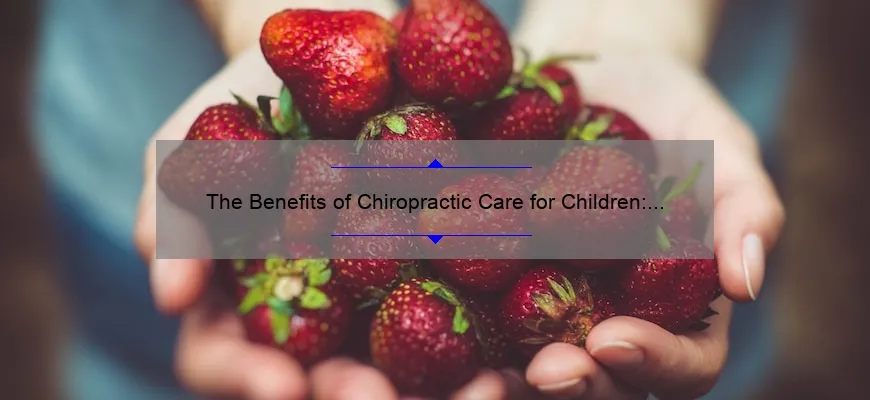Chiropractic care for kids refers to the use of chiropractic techniques and treatments for children. It aims to promote their overall health and well-being by addressing musculoskeletal issues, such as misalignments or subluxations. Chiropractors adjust the spine and other joints to improve the body’s function and alleviate any related symptoms. While controversial, some studies suggest potential benefits, but more research is needed to fully understand its effectiveness and safety for pediatric patients.
Many chiropractors believe that spinal adjustments can help promote wellness, improve overall health, and address certain conditions in children. However, it is crucial to ensure that the chiropractor you choose has experience and training in treating children.
Some pediatric conditions that parents seek chiropractic care for include colic, ear infections, ADHD, and a variety of musculoskeletal issues. Some studies have suggested that chiropractic care may offer benefits for certain conditions, but evidence is limited and further research is needed to understand the effectiveness and safety of chiropractic care in pediatric populations.
It is also important to note that children’s bodies are still developing, and their bones and joints are more flexible than adults’. Therefore, some techniques used in adult chiropractic care may not be suitable for children, and adjustments should be modified accordingly. Chiropractic care for children typically involves gentler techniques, including soft tissue work, exercises, and recommendations for proper posture and ergonomics.
Ultimately, when considering chiropractic care for children, it is wise to consult healthcare professionals who can evaluate your child’s specific condition, weigh the potential benefits and risks, and provide appropriate advice tailored to your child’s needs.
What conditions or symptoms can chiropractic care address in kids?
Chiropractic care can address various conditions or symptoms in kids, including but not limited to:
1. Colic and excessive crying
2. Ear infections
3. Acid reflux or gastrointestinal issues
4. Sleep disturbances
5. Torticollis (neck muscle imbalance)
6. Asthma and allergies
7. ADHD and learning disabilities
8. Growing pains
9. Scoliosis and postural problems
10. Sports injuries or musculoskeletal problems
It is important to note that the effectiveness of chiropractic care may vary from child to child. Proper consultation with a qualified pediatric chiropractor is essential to determine the appropriate treatment plan based on the child’s specific condition.
How does chiropractic care differ for children compared to adults?
Chiropractic care for children differs from that for adults in several ways. Firstly, children have developing bodies with growing bones and joints, so chiropractic techniques used for them are typically gentler and more age-appropriate. Additionally, children’s conditions and complaints often differ from those of adults. While adults may seek chiropractic care for issues such as back pain or posture problems, children often require treatment for conditions like ear infections, colic, or bedwetting. Furthermore, chiropractors who work with children often undergo specialized training and have experience in pediatric chiropractic care to ensure safe and effective treatment for young patients.
Why should parents consider chiropractic care as a part of their child’s healthcare routine?
There are several reasons why parents should consider chiropractic care as a part of their child’s healthcare routine. Firstly, chiropractic care focuses on the overall health and well-being of the child by promoting proper spinal alignment and nervous system function. This can help enhance the child’s immune system, improve their sleep quality, and boost their overall physical and mental development.
Secondly, children are highly active and often engage in sports or other physical activities that can lead to injuries or misalignments in the spine. Chiropractic adjustments can help address these issues, support proper healing, and prevent further complications or long-term damage.
Furthermore, chiropractic care can aid in addressing common childhood health issues such as colic, ear infections, asthma, allergies, digestive problems, and ADHD. By correcting spinal misalignments that may be contributing to these conditions, chiropractic care can provide natural and drug-free solutions that may supplement or even replace traditional medical treatments.
Lastly, chiropractic care for children is safe and gentle, using specialized techniques and equipment that are specifically designed for their developing bodies. Chiropractors who work with pediatric patients undergo additional training to understand the unique needs and considerations of children, ensuring a safe and effective treatment approach.
Overall, parents should consider chiropractic care for their children to support their overall health, prevent injuries, address specific health concerns, and provide a natural and drug-free alternative to traditional medical interventions.
Are there any potential risks or side effects of chiropractic adjustments for kids?
Yes, there are potential risks and side effects associated with chiropractic adjustments for kids. Common side effects may include soreness, discomfort, or slight bruising at the site of adjustment. However, serious adverse effects are rare but possible, such as fractures, nerve injuries, or complications resulting from improper technique or manipulation of the spine. It is important for parents to ensure that they seek chiropractic care from qualified and experienced practitioners who specialize in treating children to minimize these risks.
Can chiropractic care help in improving children’s overall development and well-being?
Chiropractic care has been found to have positive effects on children’s overall development and well-being. Regular chiropractic adjustments help ensure proper alignment and function of the spine, which can have a significant impact on the functioning of the nervous system. Since the nervous system controls all other systems in the body, including growth and development, maintaining proper spinal alignment can contribute to improved overall health. Chiropractic care has also been associated with reduced colic symptoms, improved sleep, enhanced immune function, and improved cognitive and behavioral development in children. However, it is important to note that chiropractic care should always be provided by qualified and experienced professionals who specialize in pediatric care.
What should parents expect during a child’s chiropractic session?
Parents should expect their child to be examined and treated by a qualified chiropractor who specializes in pediatric care. The session may begin with a thorough assessment of the child’s medical history and any specific concerns the parents may have. The chiropractor will then evaluate the child’s posture, range of motion, and spinal alignment. The treatment may involve gentle adjustments or manipulations tailored to the child’s age and condition. The chiropractor may also use other techniques such as soft tissue therapy, stretches, or exercises. Throughout the session, parents can expect a child-friendly environment and clear communication from the chiropractor about the procedures and expected outcomes.
How can chiropractic care complement other pediatric treatments or therapies?
Chiropractic care can complement other pediatric treatments or therapies in several ways. Firstly, chiropractic adjustments can help improve alignment and mobility of the spine, which can support the effectiveness of other treatments by enhancing overall bodily function.
Additionally, chiropractors often work in collaboration with other healthcare providers to develop a comprehensive treatment plan for pediatric patients. They can provide valuable input and recommendations based on their expertise in spinal health and nervous system function.
Chiropractic care can also address specific issues that may not be the primary focus of other treatments or therapies. For example, it can help relieve musculoskeletal discomfort or improve posture, which can have a positive impact on a child’s overall well-being.
Furthermore, chiropractors can educate parents on lifestyle modifications, nutritional support, and exercise routines that can complement traditional therapies. This holistic approach can contribute to a more comprehensive and integrated treatment plan, maximizing the potential benefits for the child.
It is important to note that chiropractic care should always be integrated and coordinated with other pediatric treatments or therapies under the guidance of healthcare professionals.
Are there any age restrictions or limitations for children seeking chiropractic care?
Yes, there can be age restrictions or limitations for children seeking chiropractic care. While chiropractic care is generally safe for children, some chiropractors may have specific age restrictions or limitations based on their expertise and comfort level in treating certain age groups. Furthermore, the approach and techniques used may vary depending on the child’s age and developmental stage. It is advised to consult with a qualified chiropractor who specializes in pediatric care to determine the appropriateness and safety of chiropractic treatment for children of different ages.
Are there any specific techniques or approaches used in chiropractic care for children?
Yes, there are specific techniques and approaches used in chiropractic care for children. Chiropractors who specialize in pediatric care may use gentle techniques such as low force adjustments, modified table or equipment, and specific instruments designed for use on children. They may also use techniques such as craniosacral therapy, soft tissue work, and exercises tailored to the child’s needs. Additionally, chiropractors may focus on promoting wellness, proper nutrition, and healthy lifestyle habits in their approach to pediatric care.
| Topic | Benefits |
|---|---|
| Improved Immune System Function | Enhances the body’s ability to fight off infections |
| Enhanced Development and Growth | Optimizes nervous system function for proper development |
| Better Sleep Patterns | Supports healthier sleep duration and quality |
| Reduced Colic and Ear Infections | Aids in resolving common infant health issues |
| Improved Digestive Health | Promotes proper digestion and nutrient absorption |
| Enhanced Cognitive Function | Optimizes brain and nervous system communication |
| Improved Behavior and Mood | Assists in regulating emotions and behavior |
| Injury Prevention | Helps reduce the risk of injuries during childhood activities |
| Supports Overall Wellness | Promotes a healthy lifestyle and balanced well-being |






